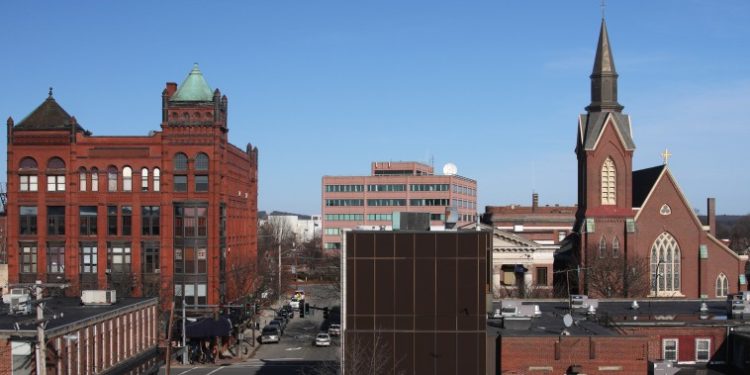“NH City Quadruples Chipmaking for Fighter Jet Power-Up!
The city of Hudson, New Hampshire has been preparing to undertake a major venture in chipmaking for fighter jets. The move is expected to quadruple its current chipmaking capabilities and will have positive effects on the town’s economy.
The project started in November of 2019, when Hudson was selected by the Department of Defense as the new home for a $100 million plant to produce specialized chips for the F-35 Lightning II fighter jets. The move would ultimately create jobs for the local population and strengthen the city’s economy by providing additional stability in the manufacturing sector.
The Hudson plant was chosen for its ability to produce high-quality components while providing cost savings to the DoD. It is expected that at full capacity, the plant will be able to produce 24,000 chips per year at a rate of 72,000 chips per month, nearly quadrupling the city’s chip-making capabilities.
The project has been warmly welcomed in the town. The plant is expected to create at least 100 active jobs and to generate $2.17 million for the local economy. This is substantially more than the city’s current chip-making industry, which employs just 17 people and generates $1.5 million in taxes.
The project has also been welcomed by environmental groups, who see it as a chance to bring greater sustainability to the city. The new plant will use renewable energy sources to produce the chips and is expected to reduce energy consumption by up to 25 percent.
The Hudson Plant is scheduled to open in early 2021 and is expected to provide a boost to the local economy. Once opened, it will be the first of its kind in the region and will create stability and opportunities for the city.
The F-35 Lightning II fighter jet is one of the world’s most sophisticated war machines, and the manufacturing of its electronic components will make Hudson the epicenter of the F-35 supply chain. The Hudson Plant is a direct result of the strategic partnership between the DoD and Hudson, and it is a major step forward for the city’s chip-making industry.
With the new plant, Hudson is now able to tap into a larger market that will bring global opportunities. It is expected that the plant will strengthen the city’s economy and provide economic stability. As a result, the town is well-positioned to build a prosperous future.
The city of Hudson, New Hampshire has been preparing to undertake a major venture in chipmaking for fighter jets. The move is expected to quadruple its current chipmaking capabilities and will have positive effects on the town’s economy.
The project started in November of 2019, when Hudson was selected by the Department of Defense as the new home for a $100 million plant to produce specialized chips for the F-35 Lightning II fighter jets. The move would ultimately create jobs for the local population and strengthen the city’s economy by providing additional stability in the manufacturing sector.
The Hudson plant was chosen for its ability to produce high-quality components while providing cost savings to the DoD. It is expected that at full capacity, the plant will be able to produce 24,000 chips per year at a rate of 72,000 chips per month, nearly quadrupling the city’s chip-making capabilities.
The project has been warmly welcomed in the town. The plant is expected to create at least 100 active jobs and to generate $2.17 million for the local economy. This is substantially more than the city’s current chip-making industry, which employs just 17 people and generates $1.5 million in taxes.
The project has also been welcomed by environmental groups, who see it as a chance to bring greater sustainability to the city. The new plant will use renewable energy sources to produce the chips and is expected to reduce energy consumption by up to 25 percent.
The Hudson Plant is scheduled to open in early 2021 and is expected to provide a boost to the local economy. Once opened, it will be the first of its kind in the region and will create stability and opportunities for the city.
The F-35 Lightning II fighter jet is one of the world’s most sophisticated war machines, and the manufacturing of its electronic components will make Hudson the epicenter of the F-35 supply chain. The Hudson Plant is a direct result of the strategic partnership between the DoD and Hudson, and it is a major step forward for the city’s chip-making industry.
With the new plant, Hudson is now able to tap into a larger market that will bring global opportunities. It is expected that the plant will strengthen the city’s economy and provide economic stability. As a result, the town is well-positioned to build a prosperous future.










